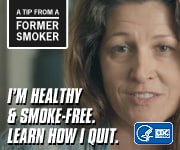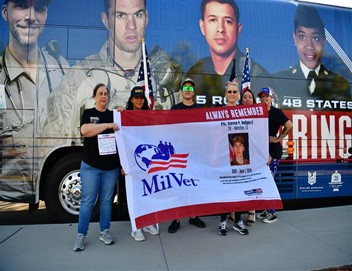As of this month, 81.5 percent of the U.S. population lives under a smoking ban on workplaces, and/or restaurants, and/or bars, either by state, commonwealth or local law. Twenty-eight states have enacted bans on smoking in all enclosed public places, including all bars and restaurants. And a smoking ban (either state or local) has been enacted covering all bars and restaurants in each of the 60 most populated cities in the United States.
In all, about 94 of 196 countries in the world seem to have some sort of anti-smoking laws, and many more have proposed laws on the table.
It’s not as socially acceptable to smoke as it used to be, and you’ll find more and more smoke-free public places these days. Even the media is more active at increasing the awareness of the dangers of cigarette smoke.
Only about 19 percent of Americans are currently smokers. And, in addition to public places, friends and family are now requesting that their guests ensure their cars and homes remain smoke-free. It can be hard to find a place to smoke these days.

Nicotine is a very addictive drug – it causes emotional and physical dependence by interfering with nerve cell pathways … and it calms your nerves by acting as a depressant. It sounds ridiculous – it’s just a cigarette! – but I can still very easily imagine smoking one and how it made me feel afterward.
There are many reasons to quit smoking; I think we can all agree that smoking is toxic and is directly linked to many serious health conditions. Even the smokers know this. But there are other reasons that might motivate people to quit, such as recognizing the health problems that secondhand smoke can cause for one’s family members, children and friends; wanting to set a good example; and more superficially, not liking how smoking makes one smell and look.
Quitting smoking requires a lot of self-motivation, preparation and resources. I didn’t quit for good until 2002. My motivation was competition – my husband and I planned to quit together in the new year, and I was not going to be the one to give in and backslide. My plan was to focus on the competition, creating distractions for myself and to have chewing gum nearby at all times. I still chew a lot of gum, and at times have a toothpick habit. These helped to alleviate my cravings and I played soccer and exercised with friends as well, which helped to work the toxins out of my system.
But, as with many things, the best way to quit is to have a plan. You might take the time to write down the pros and cons of smoking and quitting, and this could help you to see why you want to do this.
Pick a day that you’re going to quit, and stick with it!
Choose how you’ll do it – I’ve heard of people ceremoniously destroying their last remaining cigarettes, and I’ve had friends who just put down the pack and lighter and then let it go.

The American Cancer Society has published a guide that explains the steps to becoming tobacco-free. A helpful blog for Servicemembers, Veterans and their families is UCanQuit2.
Seeking help for both the emotional and physical aspects of smoking is important for successful quitting.
Emotional support for smoking cessation includes:
Telephone-based programs. Every state has a free, telephone-based program that can refer callers to a trained counselor in smoking cessation. Those who use telephone-based programs have a higher success rate of smoking cessation.
Smoking cessation programs and support groups. These are located in workplaces, hospitals, and wellness centers. Remember to research these programs before joining to make sure they are legitimate. VA also offers support and programs for Veterans who want to quit smoking.
Family and friends. The support of family and friends is crucial to successful smoking cessation.
Physical support for smoking cessation includes:
Nicotine replacement therapy (NRT). NRT comes in the form of patches, gums, nasal spray, inhalers and lozenges.
Prescription drugs. These drugs are considered “off-label” and are only available with a prescription. They are not recommended for pregnant women, teens or those who smoke less than 10 cigarettes per day.
Acupuncture, hypnosis and smoking deterrents. These methods may help, but there is a lack of strong evidence supporting their effectiveness in smoking cessation.
As I experienced, it may take several tries to quit for good, but keep at it. It’s your health and when – like me – you weather that first winter without your traditional smoker’s “illness,” you’ll be glad you did it.
Kimberly Suddeath, a former dietetic intern at the Memphis VA Medical Center, contributed the factual information and resources to this article. She graduated from Harding University where she received her BS in dietetics.
Topics in this story
More Stories
VA remains open for business and is closely monitoring the Change Healthcare (CHC) cybersecurity incident.
Carry The Load, an organization dedicated to remembering the fallen, will visit 34 VA National Cemeteries traveling 20,000 miles along five separate routes covering all continental 48 states known as the National Relay for Memorial May 2024.
Over the five-year program, more than 14,000 VET TEC beneficiaries completed their program and nearly half have reported finding meaningful employment with an average starting annual salary of $65,000.








I have been smoking for some 53 years and have quit many times (in excess of 2 dozen times). I have used Chantix, classes in cessation, have chewed gum until fillings come out of my teeth, used patches and carrot sticks to alleviate the urges. Due to severe arthritis and joint replacements, I cannot exercise as much as I would like (when weather permits, I walk some 2 miles a day at a 13 minute per mile pace) but for 7 weeks, the weather has kept me from exercising. I have contacted the state of Tennessee for assistance several times but have had no responses. I live some 3.5 hours each way from a VA hospital so it is not practical to go there. Any suggestions that will work? I am out of ideas.
Hi, nice blog Really very interesting post shared above. Awaiting for more posts like this.